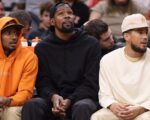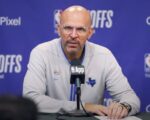OKLAHOMA CITY — The lead wasn’t big enough.
The Thunder had opened the 2025 NBA Finals with a borderline-unbelievable half of defensive basketball. They’d forced the visiting Pacers into a whopping 19 turnovers of all shapes and sizes — travels in the open floor, kickouts airmailed into the backcourt, thread-the-needle bounce passes picked off, bobbled pocket passes, moving screens, 24-second violations, you name it.
Indiana entered the Finals scoring nearly 120 points per 100 possessions, a pristine picture of offensive efficiency. And for two quarters, against the best defense in the NBA, they could barely successfully complete a pass.
“Through the course of the game, it kept getting … it felt like it could get ugly,” Pacers superstar Tyrese Haliburton said. “Who knows where this game is heading?”
“I think obviously, when you turn the ball over that much, you expect to be down 20-plus,” Pacers forward Pascal Siakam added.
They weren’t, though. When the halftime buzzer sounded, they were down by only 12, and after three quarters, they were only down by eight, and if we have learned anything in this postseason, it’s that if you do not decapitate these Pacers, no matter how deep you bury them, they are going to climb back out of the hole and do something to you that has a chance to haunt you for the rest of your days.
They did it to Milwaukee. They did it to Cleveland. They did it to New York. And in Game 1 of the NBA Finals, they did it to Oklahoma City, leaving a capacity crowd at Paycom Center bereft in stunned silence, and a 68-win juggernaut as the latest victim of Indiana’s incomparable brand of grand theft — reeling from the same sort of jarring, reality-altering blow that befell the Pacers’ previous opponents.
“I mean, it sucks,” said Thunder forward Jalen Williams. “I don’t know.”
After Williams stole an errant inbounds pass and took it the other way for a pick-six dunk, Oklahoma City led by 15 with 9:42 to go. The Pacers outscored them 32-16 from there, derailing what had felt for most of the night like it should’ve been a walk of a win for the heavily favored hosts.
“I mean, I don’t know if ‘went off the rails’ is the correct term,” Thunder guard Alex Caruso said. “We lost the game. I thought we played good enough to win. We just didn’t finish the game.”
No, they didn’t. The Thunder shot just 4-for-16 from the field after Williams’ runout dunk, with nine of the misses coming from starters Williams, Chet Holmgren, Luguentz Dort and Cason Wallace — who took center Isaiah Hartenstein’s spot in the first five, in a move head coach Mark Daigneault said was aimed at giving Oklahoma City better defensive answers against the backcourt of Haliburton and Andrew Nembhard. In the biggest moment of the game, it was Wallace who found himself on the business end of Haliburton’s latest final-second dagger — yet another monstrous shot to cap a 12-2 Pacers run in the final 2:52 of the fourth quarter, and deliver yet another nearly unbelievable-except-that-this-team-keeps-making-you-believe-it victory.
The Pacers have now cheated death FOUR times in this year’s playoffs.
– Bucks: 97.9 win% up 7 points in final 35 seconds
– Cavaliers: 95.9 win% up 7 points in final minute
– Knicks: 99.7 win% up 14 points in final 3 minutes
– Thunder: 96.4 win% up 9 in final 3 minutes pic.twitter.com/NZ5Ktp8Rko— Ben Golliver (@BenGolliver) June 6, 2025
“Yeah, you don’t want to live and die with the best player on the other team taking a game-winner with a couple seconds left,” Caruso said. “You want to try to control the game coming down so it doesn’t fall into that.”
Oklahoma City squandered a golden opportunity to control the game in the first half, turning those 19 Pacer turnovers into only nine points and shooting just 37% from the field as a team. It squandered another in the third quarter, struggling to get stops or generate turnovers as Indiana “loosened us up a bit,” as Daigneault put it, resulting in the Thunder merely trading baskets rather than extending their lead. And it squandered one more in the fourth, coming up empty on five of its final six possessions — with plenty of help from an aggressive Indiana defense — to leave the door open for Haliburton to, once again, kick it off the hinges.
“Our offense was really slow, I think,” Williams said. “We kind of let that dictate how we played on defense … It was kind of like we were trying to play like we were trying to keep the lead instead of trying to extend it, keep being aggressive.”
If that sounds familiar to you, it might be because Knicks forward Josh Hart said something very similar after the Pacers shocked New York in Game 1 of the Eastern Conference finals two weeks ago.
“It looked like we were playing not to lose,” Hart said. “We’ve got to make sure we don’t make that mistake again.”
New York didn’t make that specific mistake again. (In fairness, they didn’t have very many big leads to protect for the rest of the series.) That didn’t matter, though: Doing it once gave Indiana the lead in the series and home-court advantage in the best-of-seven set, and bolstered their already considerable confidence that they could win even on a night when they didn’t have their fastball from the jump. Now, you need a telescope to be able to locate just how high the Pacers’ sense of self has soared … and the Thunder need a trip back to the film room and the drawing board.
“Yeah, I mean, the playoffs take you to the limit,” Daigneault said. “They put your back against the wall — in games, in series. If you make it this far, you have to endure to do that. It gives you rich experiences that you can draw on … We don’t have to be perfect, but we do have to learn from it. This is a team we haven’t played a ton this season. Tonight gave us a feel for them.”
The challenge now: not allowing that feeling — the sudden sharp shock of an uppercut to the jaw — to linger. The silver lining around the gray stormcloud that settled over Bricktown on Thursday night? This isn’t the first time the Thunder have had to shake off a knockout punch and get back in the ring.
“Yeah,” Dort said. “Happened before.”
“The Denver series, Game 1, is eerily similar to this,” Caruso said.
“Well, it sucks, but we have been here before,” Williams said. “Obviously, like, the Denver series.”
After dropping the first game of the second round to the Nuggets, Gilgeous-Alexander stepped to the podium and said it would be “fun” for young Oklahoma City “to find out what we’re made of, what we’re really made of.” The Thunder would go on to win four of the next six games, surviving the toughest test of their season, and giving themselves a chance to compete for the Larry O’Brien Championship Trophy.
When Aaron Gordon’s Game 1-winning triple was evoked on Thursday, Gilgeous-Alexander immediately smiled.
“Me personally, how you lose doesn’t really matter,” Gilgeous-Alexander said. “Obviously, it sucks — last-second shot, the energy in the arena, stuff like that. But we lost, at the end of the day. We lost Game 1. We’ve lost Game 1 before. On the other side of that, we came out a better team. That’s our goal. That’s our mentality: to try to learn a lesson from the loss, like we always do, and move forward and be better.”
To a man, from Daigneault on down, the Thunder toed the company line: get back to zero, have a 0-0 mentality, credit them but it’s first to four, we have to look at the film and see where we can better, etc. And there’s plenty to clean up, from the finishing struggles that saw them shoot just 23-for-54 in the paint (42.6%) to the second-half defensive slackening that allowed Indiana to score 66 points in 48 second-half possessions — a scorching 137.5 offensive rating — with 10 made triples in 20 tries.
“You have to eliminate the ones that we give up that are out of rotation where we don’t get there in time, or in early transition where we’re not matched up,” Caruso said. “I give them credit. They made big shots. Myles Turner banked in a side-step 3. Made one in the corner. Nesmith made one highly contested over me. Nembhard threw in one off of an iso that was highly contested. Big shots. Maybe we just get the luck of the bounce and one doesn’t go in, it’s a different feeling.”
That’s the thing, though: In this postseason, all the lucky bounces seem to be going the Pacers’ way. (Maybe they are a team of destiny.) So if the Thunder are going to beat Indiana, they’re going to have to make their own good fortune — starting by finding a way to shake off an absolute heartbreaker and maintain their trademark defensive intensity for the full 48 minutes in Sunday’s Game 2.
“I think on this stage, you don’t have time to be stunned,” Pacers center Myles Turner said. “You don’t have time to be disappointed. Again, you have to move on.”
Daigneault espoused confidence that his players would be able to do that — to compartmentalize, to lean on their preparation and habits, to be “able to get ourselves centered and play our best game in the next game.” That process starts, as Caruso sees it, with remembering that even the most painful loss is only one loss.
“I mean, it counts the same as when we lost by 40 in Minnesota in the last series,” Caruso said. “Counts the same as when we lost by two or three at Denver, Game 3 that series. It’s all worth one. That’s the silver lining of it.”
But being able to see the silver lining doesn’t make the cloud any less gray.
“At the same time, it’s a loss,” he said. “If we don’t recognize that and feel it — if it doesn’t hurt right now, you’re not frustrated with it — obviously, there’s something wrong with you.”







